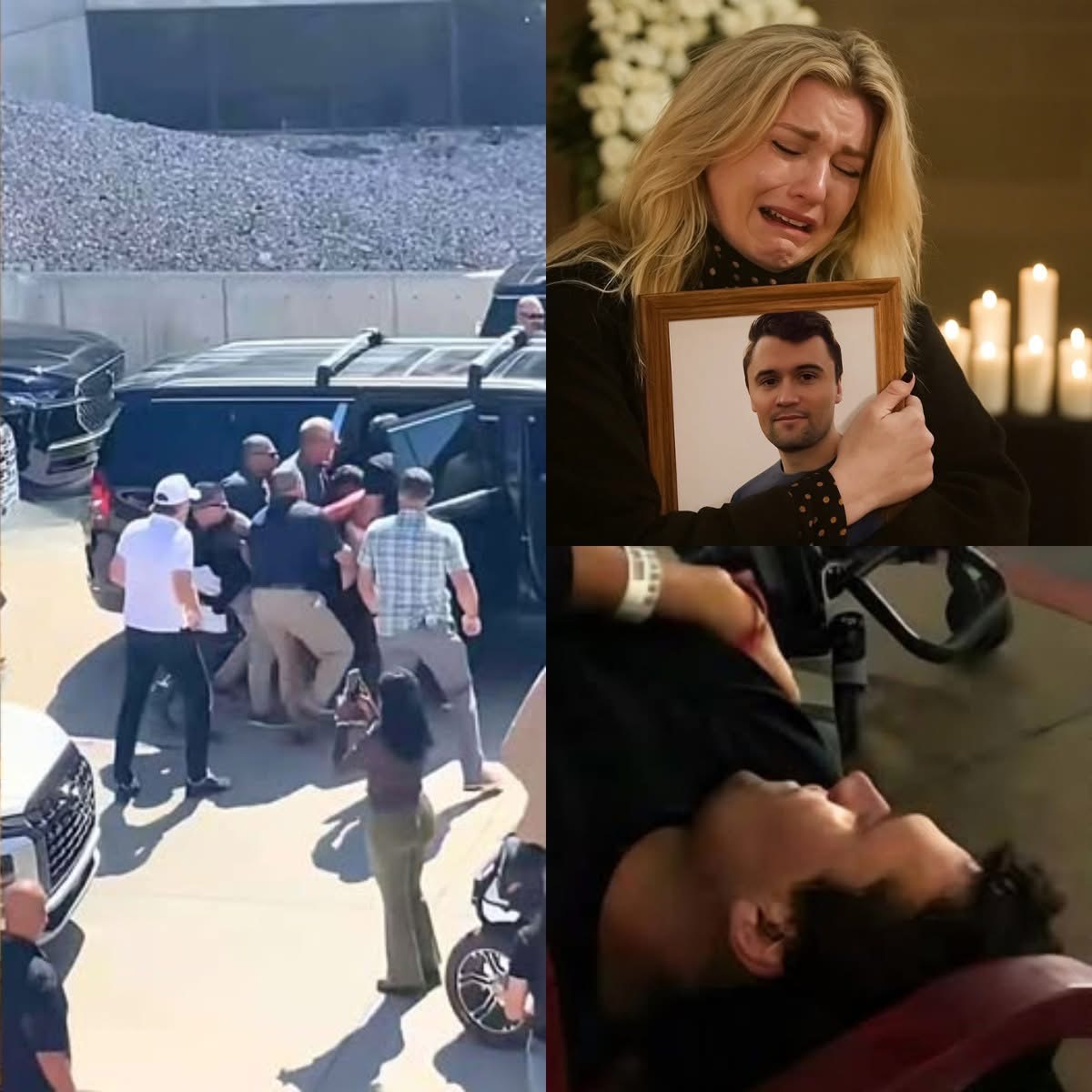The United States was left stunned this week after the release of a shocking video capturing the final moments of conservative activist and commentator Charlie Kirk. The footage, originally filmed by a member of the emergency response team as part of medical documentation, has now spread online, sparking intense debate about not only Kirk’s sudden death but also the ethics of media, the right to privacy, and the deep political divisions he leaves behind.
From Routine Lecture to Tragedy
On the evening of September 10, Kirk was addressing a packed university auditorium during a lecture on free speech and civic duty. Known for his sharp rhetoric and ability to attract large crowds, he was in his element, blending humor, critique, and politics to the delight of his audience of students, faculty, and supporters.
But the lively atmosphere shifted without warning. Witnesses say a loud, unsettling noise pierced the hall. Kirk faltered mid-sentence, appeared confused, and collapsed on stage. Chaos erupted instantly—students screamed, some rushed for the exits, and security scrambled to restore order as panic spread.
Emergency responders arrived within minutes, fighting desperately to resuscitate Kirk in front of a shocked and silent crowd. What followed—captured in the now-viral leaked video—has fueled one of the most heated national conversations in recent memory.
The Leaked Video
The clip shows Kirk lying on the stage surrounded by medics performing chest compressions and other emergency procedures. In one chilling moment, his lips seem to move faintly, as if he were trying to say something, though the words remain unclear.
The footage, never intended for public eyes, appeared on social media within hours, setting off outrage and speculation. Platforms like TikTok, X, and Instagram flooded with slowed-down versions, reaction videos, and endless theories about Kirk’s possible final words.
The ethics of sharing such intimate, devastating content quickly became a flashpoint. Many condemned the leak as a gross violation of privacy and a cruel intrusion into his family’s grief. Others insisted that, painful as it may be, the video represents a pivotal moment in political history.
Shock and Grief Across the Nation
The release of the video triggered waves of grief nationwide. To his supporters, Kirk was more than a political figure—he was a tireless defender of conservative causes and free speech. Even many critics, while remembering their fierce disagreements with him, acknowledged the suddenness and cruelty of his death.
One viewer wrote online: “I watched once and couldn’t watch again. It’s not just what happens—it’s the silence after. You can feel the helplessness in that room.”
Another remarked: “No matter your politics, no one should have to die like that, especially in front of so many young people who admired him.”
A Political Void
At just 31, Kirk had already reshaped the political landscape as the founder of Turning Point USA, a powerhouse in conservative youth activism. His reach extended from college campuses to national television and social media, where he inspired a generation of young conservatives.
His death leaves a significant gap. Allies pledged to carry on his work, with one Turning Point colleague saying: “Charlie’s voice woke up thousands. That voice will live on through the movement he built.”
Even former rivals offered condolences. A syndicated talk show host who often sparred with Kirk admitted: “We disagreed on almost everything, but he was part of the same national stage. His loss is a reminder of how fragile life really is.”
The Haunting Mystery of His Last Words
The sight of Kirk’s lips moving faintly in the video has become one of its most haunting elements. Online communities have obsessed over the possibility of final words, dissecting the clip frame by frame.
Doctors caution against such speculation, explaining that unconscious murmurs or involuntary movements are common in traumatic collapses. “It’s medically unlikely that his words could be made clear from such footage,” one emergency physician said. “Reading too much into it only misleads.”
Still, the mystery lingers, adding both sorrow and intrigue to his final moments.
Anger Over the Leak
Beyond mourning, outrage is mounting over how the footage was released. The physician who filmed it insisted it was meant solely for clinical purposes. Investigators are now probing how it reached the public.
Critics argue the leak reflects a dangerous erosion of privacy in an era where even the most sacred moments can be broadcast to millions. “The family deserved dignity, not viral spectacle,” one media ethicist stated.
The controversy has reignited urgent debates over the boundaries between transparency and respect, especially in the digital age.
Larger Implications
The tragedy raises hard questions about security at public events, social media’s role in amplifying trauma, and society’s appetite for consuming such content. Why do millions feel compelled to watch? Should platforms intervene more aggressively to restrict such videos?
Universities and event organizers are already considering tighter restrictions on filming during emergencies to avoid future leaks.
Remembering the Man Behind the Controversy
Amid the swirl of speculation, many are urging the public to remember Kirk for his life, not just his death. Supporters celebrate his relentless energy, sharp debating skills, and devotion to rallying young conservatives.
Even his detractors concede that his influence was undeniable—and that his absence will reshape political discourse for years to come.
What Lies Ahead
Investigators continue to study both the cause of Kirk’s sudden collapse and the breach that led to the video leak. Autopsy results may soon provide answers, but the ethical questions raised by the footage are likely to persist far longer.
For now, America is left with a sobering memory: a man at the height of political debate brought down in an instant, his last moments replayed endlessly across millions of screens.
What was supposed to be another fiery lecture on free speech has instead become a profound reminder of human fragility—Charlie Kirk’s final appearance forever entwined with a nation struggling to reconcile grief, politics, and the consequences of an always-connected world.
